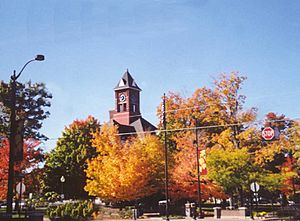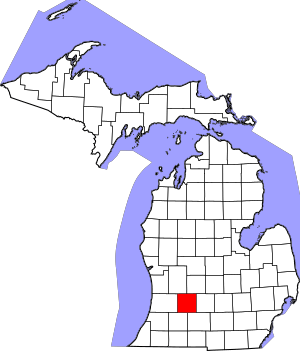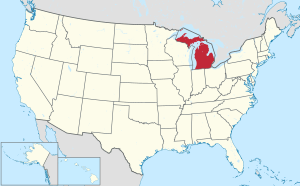Barry County, Michigan facts for kids
Quick facts for kids
Barry County
|
|
|---|---|

Barry County Courthouse
|
|

Location within the U.S. state of Michigan
|
|
 Michigan's location within the U.S. |
|
| Country | |
| State | |
| Founded | April 29, 1829 (established) March 15, 1839 (organized) |
| Named for | William Taylor Barry |
| Seat | Hastings |
| Largest city | Hastings |
| Area | |
| • Total | 577 sq mi (1,490 km2) |
| • Land | 553 sq mi (1,430 km2) |
| • Water | 24 sq mi (60 km2) 4.2%% |
| Population
(2020)
|
|
| • Total | 62,423 |
| • Estimate
(2023)
|
63,808 |
| • Density | 108.19/sq mi (41.77/km2) |
| Time zone | UTC−5 (Eastern) |
| • Summer (DST) | UTC−4 (EDT) |
| Congressional district | 2nd |
| Website | https://www.barrycounty.org/ |
Barry County is a county located in the state of Michigan, USA. In 2020, about 62,423 people lived there. Its main city, or 'county seat,' is Hastings.
Contents
History of Barry County
Long ago, before Michigan became a state, Native American tribes like the Potawatomi and Ojibwe lived in this area. Later, the U.S. government made agreements with these tribes. They gave up their lands in exchange for payments and smaller areas called reservations. The Match-E-Be-Nash-She-Wish Band of Pottawatomi still has a reservation nearby in Allegan County.
Barry County was officially created by the Michigan Territory government on April 29, 1829. It was named after William Taylor Barry, who was the United States Postmaster General at the time. He was one of ten people in President Andrew Jackson's cabinet who had Michigan counties named after them.
By 1839, Michigan had become a state. In that year, the state government officially organized Barry County as its own independent area.
In 1939, oil was discovered in Barry County. Other nearby counties also found oil between 1937 and 1972.
Geography of Barry County
Barry County covers a total area of about 577 square miles. Most of this, about 553 square miles, is land. The remaining 24 square miles, or 4.2%, is water.
Neighboring Counties
Barry County shares borders with several other counties:
- Ionia County to the northeast
- Eaton County to the east
- Calhoun County to the southeast
- Kalamazoo County to the southwest
- Allegan County to the west
- Kent County to the northwest
Transportation in Barry County
Main Roads
Several important state highways pass through Barry County:
 M-37 runs from the northwest part of the county through Hastings and then south.
M-37 runs from the northwest part of the county through Hastings and then south. M-43 enters from Kalamazoo and goes through Delton, Hastings, and Carlton.
M-43 enters from Kalamazoo and goes through Delton, Hastings, and Carlton. M-50 touches the northeast tip of the county near Woodbury.
M-50 touches the northeast tip of the county near Woodbury. M-66 enters from Calhoun County in the southeast and goes north through Nashville.
M-66 enters from Calhoun County in the southeast and goes north through Nashville. M-78 crosses the very southeastern tip of the county.
M-78 crosses the very southeastern tip of the county. M-79 runs west from Nashville to Hastings.
M-79 runs west from Nashville to Hastings. M-89 crosses the southwestern tip of the county.
M-89 crosses the southwestern tip of the county.- M-179 enters the western part of the county and goes east to Hastings.
Railroads
In the past, Barry County had several smaller railroads. Today, there are no active railroads for public use. Only a short two-mile section, owned by CSX Transportation, remains in the northeastern part of Woodland Township.
People of Barry County (Demographics)
| Historical population | |||
|---|---|---|---|
| Census | Pop. | %± | |
| 1840 | 1,078 | — | |
| 1850 | 5,072 | 370.5% | |
| 1860 | 13,858 | 173.2% | |
| 1870 | 22,199 | 60.2% | |
| 1880 | 25,317 | 14.0% | |
| 1890 | 23,783 | −6.1% | |
| 1900 | 22,514 | −5.3% | |
| 1910 | 22,633 | 0.5% | |
| 1920 | 21,383 | −5.5% | |
| 1930 | 20,928 | −2.1% | |
| 1940 | 22,613 | 8.1% | |
| 1950 | 26,183 | 15.8% | |
| 1960 | 31,738 | 21.2% | |
| 1970 | 38,166 | 20.3% | |
| 1980 | 45,781 | 20.0% | |
| 1990 | 50,057 | 9.3% | |
| 2000 | 56,755 | 13.4% | |
| 2010 | 59,173 | 4.3% | |
| 2020 | 62,423 | 5.5% | |
| 2023 (est.) | 63,808 | 7.8% | |
| US Decennial Census 1790-1960 1900-1990 1990-2000 2010-2018 |
|||
| Race / Ethnicity (NH = Non-Hispanic) | Pop 2010 | Pop 2020 | % 2010 | % 2020 |
|---|---|---|---|---|
| White alone (NH) | 56,487 | 56,779 | 95.46% | 90.96% |
| Black or African American alone (NH) | 205 | 295 | 0.35% | 0.47% |
| Native American or Alaska Native alone (NH) | 251 | 221 | 0.42% | 0.35% |
| Asian alone (NH) | 212 | 245 | 0.36% | 0.39% |
| Pacific Islander alone (NH) | 5 | 15 | 0.01% | 0.02% |
| Some Other Race alone (NH) | 25 | 198 | 0.04% | 0.32% |
| Mixed Race or Multiracial (NH) | 652 | 2,528 | 1.10% | 4.05% |
| Hispanic or Latino (any race) | 1,336 | 2,142 | 2.26% | 3.43% |
| Total | 59,173 | 62,423 | 100.00% | 100.00% |
Note: the US Census treats Hispanic/Latino as an ethnic category. This table excludes Latinos from the racial categories and assigns them to a separate category. Hispanics/Latinos may be of any race.
In 2010, there were 59,173 people living in Barry County. Most people (96.9%) were White. Smaller groups included Native American (0.5%), Black or African American (0.4%), and Asian (0.4%). About 2.3% of the people were Hispanic or Latino.
Many residents have family backgrounds from different countries. In 2010, common ancestries included German (19.8%), American (13.5%), English (12.1%), Dutch (11.2%), and Irish (8.1%). Most people (98.2%) spoke only English at home.
In 2000, there were 56,755 people in the county. The average family size was about 3 people. About 35.2% of households had children under 18 living with them. The median age was 37 years old.
The median income for a household in the county was $46,820. This means half of the households earned more than this amount, and half earned less. About 5.5% of the population lived below the poverty line.
Education in Barry County
Barry County has several public and private schools. Some areas also have community college extensions.
- Hastings: Has 7 public schools, 2 private schools, and an extension of Kellogg Community College.
- Delton: Has 3 public schools and 3 private schools.
- Middleville: Has 5 public schools.
Sports and Arts in Barry County
Sports
Barry County is home to the yearly Barry-Roubaix cycling race. This event attracts many cyclists.
Arts and Culture
Each summer, the Barry County Artists Exhibition takes place. It shows off the talents of local artists.
Communities in Barry County
Cities
- Hastings (This is the county seat, meaning it's the main city where the county government is located.)
Villages
Census-Designated Places (CDPs)
These are areas that are like towns but are not officially incorporated as cities or villages.
Unincorporated Communities
These are smaller communities that are not officially part of a city or village.
- Assyria
- Banfield
- Cedar Creek
- Cloverdale
- Coats Grove
- Irving
- Lacey
- Maple Grove
- Orangeville
- Prairieville
- Quimby
- Schultz
Townships
Townships are smaller local government areas within the county.
- Assyria Township
- Baltimore Township
- Barry Township
- Carlton Township
- Castleton Township
- Hastings Charter Township
- Hope Township
- Irving Township
- Johnstown Township
- Maple Grove Township
- Orangeville Township
- Prairieville Township
- Rutland Charter Township
- Thornapple Township
- Woodland Township
- Yankee Springs Township
See also
 In Spanish: Condado de Barry (Míchigan) para niños
In Spanish: Condado de Barry (Míchigan) para niños

